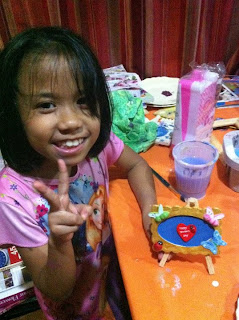'What happened to my wall, Yusuf?'
'I don't know. Alwani did it!'
'Alwani did what?'
'Alwani took a 'koko' (brown) marker pen and she did like this..' (while demonstrating how the graffiti was done)
Background noise: Alwani's whimpering, denying the accusations which was rather annoying, noisy and not needed!
'Was it fun?'
'Yes!...... eh.... I want bread please....'
(Trapped & diversion.. yes, this child can be very cheeky!!)
 |
| Should he be punished? How? |
So, as parents, what will you do?
I must admit, addressing the problem of lying isn’t easy, as there’s no one
thing you can do to make the problem go away, including using
punishment. In fact, punishment will only make things worse. HOWEVER, it needs to be addressed, as early as it happens.
1. Ask instead of accuse.
If you catch your child lying, work on figuring out why she felt
like she couldn’t tell you the truth. You can gently say, “That sounds a
bit far-fetched. You must be worried about telling me what really
happened. Let’s talk about that.” By opening the conversation this way,
you’ll get the real story — and information that can clue you in on how
to get her to demonstrate honesty in the future.
p/s: Try not to get other children to join in the conversation, she/he might get embarrassed, angry and annoyed, which make it hard for him/her to be honest. Make this conversation private and personal.
2. Observe how us, parents, respond to our kids when they misbehave or make a poor choice.
Even adults will lie to protect themselves from punishment or an
unpleasant outcome when they do something wrong — so why should we
expect anything different from our kids? True isn't it?
So, try to work on using a "calm voice" (which is not easy when you're angry!) to
address bad behavior and avoid lectures and 'physical torture'. Our child
will feel safe telling the truth when the mommies are not behaving like wild tigress!
3. Make the most of mistakes.
Kids who aren’t yelled at or punished for messing up will be more
likely to admit it when they do (next time). And when they fess up, turn the mistake
into a learning opportunity. Use this chance to teach your child the 'better ways' to tell Ummi and Abi what happened,
'Kakak and Abang were using the white boards, and Yusuf hasn't got one, and I really need to write..' (and at this time, he nodded furiously!! hahah!)
And, I used this situation to teach him that it's not nice to lie and accuse others, 'Do you like Adib (his friend at school) to say, "Ustazah, Yusuf messes up the toys" when you didn't?' (he shook his head)' and what would you feel?'
'I feel bad...' (eyes drooping like puss in boots!!! Sheeeshhh.. this drama king!)
Insya Allah, he'll react honestly when he messes up!
4. Encourage honesty.
Whenever our child tells the truth about something difficult,
commend her. “I bet it was hard to tell the truth. You really showed
some courage. Thanks for taking responsibility.”
note: Praise our (guilty) child in front of the other children since they will know that Ummi & Abi love people who tells the truth.
 |
| Telling the truth is not easy, but we need to instill it! |
5. Love unconditionally.
Our children need to know that while sometimes, we don’t like their
behavior, we’ll love them no matter what kind of mistakes they make.
Make every effort to show them they are loved (hugs are good, easy and free!) and they’ll be more likely to open up.
 |
| Cuddles help! (but you don't have to make that kind of face, Azza!) haha! |
6. Watch our own “white lies."
'Oh.. I was busy yesterday, the twins were crying all day, that's why I didn't pick it up' but your child knows that the twins were fine yesterday and you were actually busy completing your photobook!
When we let a “white lie” slip, our kids think they’re acceptable. We’ve
heard it before: set a good example!
By creating a safe environment for the truth in our household, we’ll see a lot more honesty. Better yet, we’ll be helping our children
develop the kinds of character traits that will serve them well
throughout her life, insha Allah.
Wallahu'alam.









































